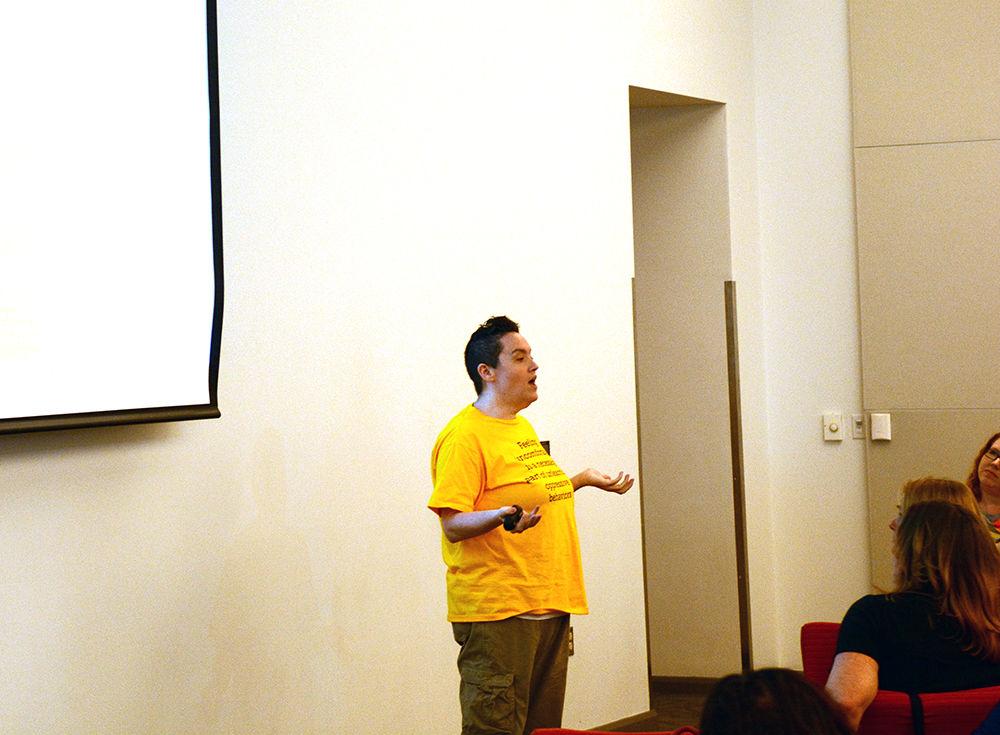 Renee Wells, director of the GLBT Center, leads a workshop on internalized oppression Monday. The workshop is the first of many events planned for October, GLBT History Month. " />
Renee Wells, director of the GLBT Center, leads a workshop on internalized oppression Monday. The workshop is the first of many events planned for October, GLBT History Month. " />
Samuel Griffin
Renee Wells, director of the GLBT Center, leads a workshop on internalized oppression Monday. The workshop is the first of many events planned for October, GLBT History Month.
The GLBT Center held the first event of the annual GLBT History Month in Talley on Monday, focusing on recognizing internal oppression in participants’ everyday lives. The theme of this year’s GLBT History Month is “Resistance Through Existence.”
Internalized oppression is defined on the GLBT Center’s website as “the ways that individuals unconsciously learn, accept, and reinforce ideas and attitudes that perpetuate inequity and oppression. This includes learned attitudes and actions related to internalized dominance and internalized subordination.”
Renee Wells, director of the GLBT Center, further explained these terms.
“Internalized oppression is essentially the way in which we, without realizing it, learn a lot of cultural messaging that ultimately either positions us to feel down towards others or feel subordinate because of our various identities,” Wells said. “So, we simply are socialized to think in certain ways and often learn without questioning or challenging the messaging that’s affecting us that were exposed to. Cultural domination is specifically messaging that we internalize to teach us that we are superior. Internalized subordination is the opposite, where one internalizes messages that devalue parts of our identity because of cultural messaging and socialization.”
Throughout the workshop, Wells had participants analyze aspects of socialization in media. This ranged from ideas such as sizeism, islamophobia, beauty standards, racism and xenophobia.
The next aspect of the event was about self-reflection of participants where they were invited to fill out surveys regarding their own cultural domination and subordination.
“In thinking about the worksheets that people did, really spending time thinking about your own experiences and about what you have internalized, whether you feel superior to others or you internalize messages that reflect your marginalization in some way,” Wells said. “It shows you where you still need to work on yourself. We often focus on the institutional and cultural aspects and don’t want to think we have to do that work internal to ourselves.”
In the final part of the workshop, Wells encouraged participants to “do the work” and liberate themselves through recognizing oppression, unpacking dominant cultural messages and replacing dominant cultural narratives.
Students attending the workshop, such as Lacquetta Armstrong, a third-year studying international studies and Terri Davis, a second-year studying engineering, explained the importance of the event along with the entirety of the month. In addition, they both encouraged other students to attend future GLBT History Month events.
“I feel like I took a lot away from this, and I feel other students could take a lot away from this,” Armstrong said. “When certain ideas are perpetuated, especially within our own government, it is really important to come here and get a different point of view.”
Davis said that the diversity and communication were the most important aspects of the event.
“In the current political climate, it’s really easy to become polarized,” Davis said. “It’s really easy to feel like you have to pick a side and not associate with people of the other side. Going to events like this really help people communicate with people who might not be on their side.”
Preston Keith, assistant director of the GLBT center, further explained the goals of GLBT History Month.
“The theme is resistance through existence,” Keith said. “So, it’s understanding the ways in which we show up in spaces and the ways in which our existence almost acts as a counter narrative to a lot of legislation that happens that targets the GLBT community, and a lot of the ways in which systems of oppression target the GLBT community. Existing as a form of resisting those types of oppression.”
For more information about GLBT History Month, check out https://oied.ncsu.edu/divweb/glbt/